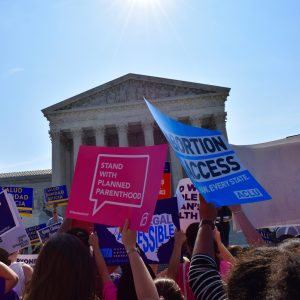Video: Planned Parenthood Will Comply With AR Law
Planned Parenthood is dropping its challenge against this pro-life law in Arkansas.
Planned Parenthood is dropping its challenge against this pro-life law in Arkansas.
 After three years of fighting the state in federal court, Planned Parenthood has agreed to obey a pro-life law Arkansas passed in 2015.
After three years of fighting the state in federal court, Planned Parenthood has agreed to obey a pro-life law Arkansas passed in 2015.
Act 577 of 2015, the Abortion-Inducing Drugs Safety Act, requires abortionists to follow FDA protocols when dispensing abortion-inducing drugs like RU-486; it also requires them to contract with a physician who has admitting privileges at a hospital — just in case the woman experiences any complications from the abortion.
Planned Parenthood claimed it was unable to find a doctor with admitting privileges who would contract with its chemical abortion facilities in Little Rock and Fayetteville, and the organization sued the state, arguing Act 577 is unconstitutional.
This week Planned Parenthood announced that it still believes the law is unconstitutional, but it’s going to follow the Abortion-Inducing Drugs Safety Act anyway.
The abortion giant told the Arkansas Democrat-Gazette that it decided to comply with the law after a doctor who has hospital admitting privileges recently agreed to contract with its abortion facilities.
Planned Parenthood is dropping its lawsuit against Act 577, and Attorney General Rutledge’s office has filed a motion in federal court essentially asking that Arkansas be allowed to enforce the law. As far as we can tell, the Abortion-Inducing Drugs Safety Act finally is going into effect as intended.
This is a really big, pro-life victory for three reasons:
1. Saving Lives: Requiring abortion doctors to follow FDA protocols prevents them from giving RU-486 to women later in pregnancy than the FDA recommends. That means chemical abortion facilities cannot perform as many drug-induced abortions as they might like to. Overall, laws like this one can help reduce the number of chemical abortions in Arkansas and save the lives of unborn babies.
Requiring abortionists to contract with a physician who has hospital admitting privileges also protects the lives and health of pregnant women who may experience life-threatening complications from botched chemical abortions.
2. Changing the Legal Battle: A few years ago, abortion facilities took the State of Texas all the way to the U.S. Supreme Court over a state law that required them to have admitting privileges at a local hospital. The U.S. Supreme Court ruled in the abortionists’ favor in 2016 in its Whole Woman’s Health v. Hellerstedt decision. At the time, many people thought that was the end of the discussion.
Fast forward to today. The Fifth Circuit Court of Appeals recently upheld a Louisiana law that is similar to Arkansas’ Act 577. The Eighth Circuit hinted that Act 577 might be constitutional in its opinion last year. The legal battle over these sorts of pro-life laws is shifting in our favor, and Arkansas is leading the way.
3. A Green Light for Future Pro-Life Laws: Since 2015, Planned Parenthood has sued Arkansas time and time again to have pro-life laws like Act 577 struck down. Now Planned Parenthood is hitting the brakes on some of those lawsuits.
In October Planned Parenthood asked a federal judge in Little Rock to temporarily pause the group’s lawsuit over the state’s decision to quit giving Medicaid money to the abortion provider. Now they are dropping their lawsuit over Arkansas’ Abortion-Inducing Drugs Safety Act as well.
The fact that Planned Parenthood seems to be retreating from some of its lawsuits in Arkansas may signal that abortionists no longer like their odds of winning if they take their case to court.
In the future, Arkansas may be able to pass pro-life laws with fewer worries about abortion advocates hamstringing those laws for months or years with lawsuits. If that happens, we could see more pro-life laws passed and more lives saved from abortion.
Attorney General Leslie Rutledge has defended Act 577 tirelessly since 2015. I don’t know of any attorney general in America who is doing more to fight for the right to life. Her team has won some major victories, and I believe we will see more in the months to come.
The Abortion-Inducing Drugs Safety Act was a law that Family Council strongly supported in 2015. We’re glad we were able to work with our friends in the Arkansas Legislature to pass this good law. We’re grateful to Governor Hutchinson for signing it into law. And we’re thrilled that this good, pro-life law is going to be enforced in Arkansas.
You can read Attorney General Rutledge’s statement about the lawsuit over Act 577 here.
Photo Credit: By jordanuhl7 [CC BY 2.0 (http://creativecommons.org/licenses/by/2.0)], via Wikimedia Commons
A recent poll shows the overwhelming majority of Arkansans believe abortion ought to be completely illegal or legal only under certain circumstances.
Watch this video to learn more.